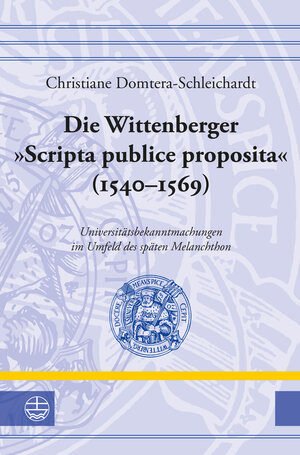
×
![Buchcover ISBN 9783374066858]()
Die Wittenberger »Scripta publice proposita« (1540–1569)
Universitätsbekanntmachungen im Umfeld des späten Melanchthon
von Christiane Domtera-SchleichardtIn der zweiten Hälfte des 16. Jahrhunderts präsentierte die Universität Wittenberg ihre sogenannten »Scripta publice proposita« der gelehrten Öffentlichkeit regelmäßig in gedruckten Sammelbänden. Anschaulich dokumentieren diese ursprünglich am »Schwarzen Brett« der Universität veröffentlichten Bekanntmachungen Lehrangebot, humanistisch-reformatorische Grundanliegen, Totengedenken, studentische Alltagskultur und Gelehrtenkommunikation an der Leucorea in der reifen Phase der Reformation. Da Philipp Melanchthon das Genre wie kein anderer geprägt hatte, setze nach seinem Tod in diesen offiziellen Verlautbarungen eine intensive Melanchthon-Memoria ein, die ihn als Leitfigur der Wittenberger Universität und Reformation exponierte und gegen Anfeindungen verteidigte.
Die umfangreichen Kataloge der Arbeit erschließen das mehrbändige Textkorpus der Wittenberger »Scripta publice proposita« erstmals systematisch und verzeichnen darüber hinaus einen Fundus weiterer Bekanntmachungen aus gedruckter und handschriftlicher Überlieferung.
[The Wittenberg »Scripta publice proposita« (1540–1569). University Announcements in Melanchthon’s Milieu] In the second half of the 16th century the University of Wittenberg regularly published its so-called Scripta publice proposita in printed volumes. These announcements, originally published on the university’s bulletin board, document curricular offerings, humanistic-reformational concerns, notices of the deaths of members of the university, the daily life of students and scholarly communication at the Leucorea during the mature phase of the Reformation. After the death of Philipp Melanchthon, who like no other shaped and distributed the genre to a wider public, an intense effort to keep Melanchthon’s memory alive took form in the official announcements, which highlighted him as a leading figure of Wittenberg University and the Reformation and defended him against hostile attacks. The extensive catalogues index the multi-volume text corpus of the Wittenberg Scripta publice proposita for the first time and also record further related announcements from printed and handwritten sources.
[The Wittenberg »Scripta publice proposita« (1540–1569). University Announcements in Melanchthon’s Milieu] In the second half of the 16th century the University of Wittenberg regularly published its so-called Scripta publice proposita in printed volumes. These announcements, originally published on the university’s bulletin board, document curricular offerings, humanistic-reformational concerns, notices of the deaths of members of the university, the daily life of students and scholarly communication at the Leucorea during the mature phase of the Reformation. After the death of Philipp Melanchthon, who like no other shaped and distributed the genre to a wider public, an intense effort to keep Melanchthon’s memory alive took form in the official announcements, which highlighted him as a leading figure of Wittenberg University and the Reformation and defended him against hostile attacks. The extensive catalogues index the multi-volume text corpus of the Wittenberg Scripta publice proposita for the first time and also record further related announcements from printed and handwritten sources.



